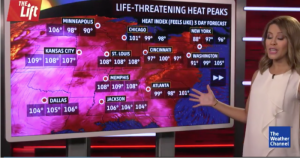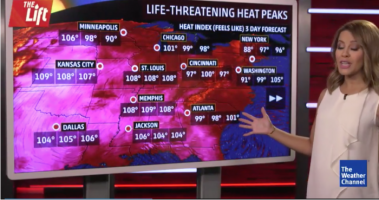“But when the thermometer starts to rise…” – you know how the old song goes, but it’s more than libido that gets going in the heat. All sorts of things go wrong. As the temperature goes up, drownings do too. Homeless people die, poor people have a tough go, and seniors, especially those who are housebound, can really suffer. So here are some tips to get you through this. 
- Listen to local weather forecasts and stay aware of upcoming temperature changes. Be aware of both the temperature and the heat index. The heat index is the temperature the body feels when the effects of heat and humidity are combined. You will here these expressions:
Excessive Heat Watch – Conditions are favorable for an excessive heat event to meet or exceed local Excessive Heat Warning criteria in the next 24 to 72 hours.
Heat Advisory – Heat Index values are forecasting to meet locally defined advisory criteria for 1 to 2 days (daytime highs= 100-105° Fahrenheit).
Excessive Heat Warning – Heat Index values are forecasting to meet or exceed locally defined warning criteria for at least 2 days (daytime highs= 105-110° Fahrenheit).
Survive the heatwave
- Stay inside. If you don’t have air conditioning, make ice. Go to the lowest room in your house where it will be coolest. Then set your fan to blow across a bowl of ice and sit in close. Close all windows and doors when it’s very hot outside and close the drapes when the sun in shining. Wear loose fitting clothes and apply cold, wet facecloths to the forehead and the back of your neck where the most blood passes near the surface. This will cool you down. Eat plain ice as it cools your core, but not ice cream or popsicles as the sugar in them will burn calories and increase your inner warmth. Drink lots of water. Open the doors and windows only if the temperature drops outside and you can create a cool draught that flows through the house.
- Check the contents of your emergency disaster kit in case a power outage occurs. See here
- Know those in your neighborhood who are elderly, young, sick or overweight. They are more likely to become victims of excessive heat and may need help.
- If you do not have air conditioning, choose places you could go to for relief from the heat during the warmest part of the day (schools, libraries, theaters, malls, cooling centers). Most modern cars have air conditioning so if the worst comes to the worst you can sit in your car for a while. Just don’t do it in a closed garage as the carbon monoxide will silently kill you.
- Be aware that people living in urban areas may be at greater risk from the effects of a prolonged heat wave than are people living in rural areas. Many inner cities rarely experience intense heat and don’t deal well with it. Darkness and the slight cooling brings people out onto the streets. The outcome is not always harmonious.
- Ensure that your animals’ needs for water and shade are met. Don’t let them sit outside for long periods.
- Going to a pool, swimming in the lake or river? Make sure you have someone whose job it is to play “lifeguard” and stand and watch the swimmers. You can take it in turns but make sure the watchers are sober. Drownings significantly increase in hot weather.
- Have to go out? Take it easy. Don’t exercise vigorously. Wear sunscreen, loose clothes, a hat, sunglasses. Have water and a cellphone with you. Recognize the signs of heatstroke: extremely high body temperature, red skin which may be dry or moist; changes in consciousness; rapid, weak pulse; rapid, shallow breathing; confusion; vomiting; and seizures. And remember heat cramps and heat exhaustion are precursors to heat stroke. Take heat very seriously, the Red Cross does.
